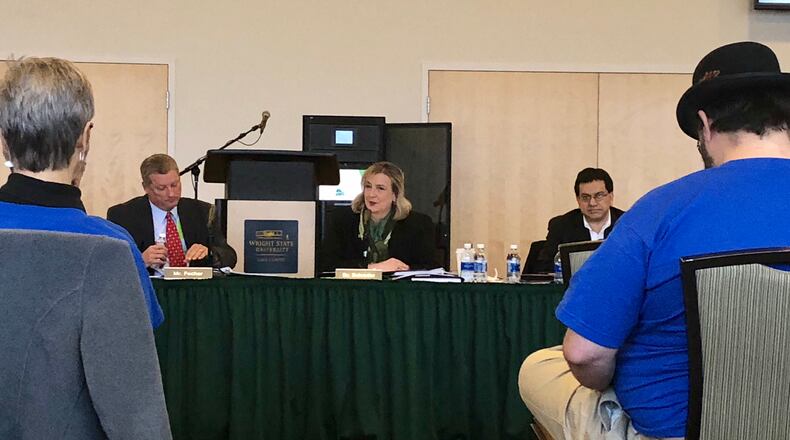“There is every opportunity to have discussions but it’s my understanding that the union has not reached out to the chief negotiator for the university,” Schrader said.
» RELATED: Faculty strike could impact Wright State’s enrollment, finances
The Wright State chapter of the American Association of University Professors filed a notice one week ago today with the State Employment Relations Board conveying plans to strike at 8 a.m., Jan. 22. AAUP-WSU president Martin Kich said the union will also file an unfair labor practice complaint with the state.
At this point, the decision as to whether or not the union and administration will reconvene negotiations is up to Schrader, said Noeleen McIlvenna, a WSU history professor and contract administration officer for the union. Union leaders were caught off-guard, McIlvenna said, when the board voted to implement its last, best offer 10 days ago.
“There is no dialogue but we have made it absolutely clear in every communication that we are ready to negotiate,” McIlvenna said.
The board’s decision to implement terms moves faculty union members into a “uniform” health care plan, maintains current rules of retrenchment, includes no pay raises and would allow faculty to be furloughed as part of “cost savings days.” In its strike notice, the union took issue with the furlough policy, changes to health care, new provisions for promotions and tenure appointment, workload and a merit pay system.
Since announcing a possible strike, union leaders posted an open letter on Facebook. In it, they encouraged students to contact the Higher Learning Commission with concerns they have regarding the quality of substitute instructors during the strike.
The Higher Learning Commission, a regional accreditation agency that oversees colleges in 19 states, is aware of the possible strike, spokesman Steve Kauffman said via email.
» RELATED: What will trigger furloughs at WSU? New ‘cost savings’ policy explained
Kuaffman declined to comment specifically on the situation unfolding at Wright State, but said the HLC “has a process in place to protect student interests during an extended suspension of instruction.”
“In these cases, depending on the length of interruption — if any, HLC would require a provisional plan be submitted by an institution,” Kauffman said via email. “That plan would outline a course of action for continuation of instruction for students for that extended period.”
Wright State has communicated with the HLC and is sharing contingency plans with it, spokesman Seth Bauguess said. Bauguess has said the university plans to maintain normal operations and that classes will continue but could be consolidated, taught online or staffed by a substitute.
Though the commission is aware of a possible strike, it is “not concerned,” Schrader said.
The HLC, which is based in Chicago, issues accreditation to degree-granting institutions, according to its website. The organization is able to place schools on probation for issues as it did with Wilberforce University in 2018 for financial problems and a lack of strategic planning.
“It’s a good thing,” McIlvenna said of the HLC’s awareness. “We would hate to lose our accreditation because they put someone unqualified in a classroom. If they say they’re taking care of it, that’s great.”
Students return to classes today after the holiday break.
Nathan Rogers, a sophomore majoring in mechanical engineering, said he has talked with friends and they’re worried about not getting their money’s worth in instruction if there’s a strike.
“We’re paying a lot for these teachers and to get an education from them. We’re worried we’re going to miss out on learning stuff,” Rogers said.
Rogers said he returns from break with a full load of classes that include thermal dynamics and high level math. He said he’s built relationships with a few of his teachers and he’s not sure if substitutes will have the same knowledge base.
“You need somebody who knows it to teach it,” he said. “I have no idea what these (substitute) teachers know, if they have any experience.”
FIVE FAST READS
• Former Wright-Patt leader named interim SOCHE president
• Easton to anchor expansion with new store in 2019
• WSU may face more scrutiny despite deal on federal visa investigation
• EXPERT: Wright-Patterson ‘crucial to avoiding a defeat if there’s a World War III,’
• What UD’s change in its China Institute says about shifts in higher education
Strike calender
Jan. 14: First day of classes.
Jan. 21: WSU closed for MLK Jr. Day.
Jan. 22: Strike set to start at 8 a.m.
Jan. 25: Last day students can withdraw with full refund.
